The storm and flood caused trees to fall everywhere. Very urgently, regardless of the hardship, the staff and workers of Hai Duong Urban Environment Joint Stock Company worked through the night to clean up Hai Duong city.
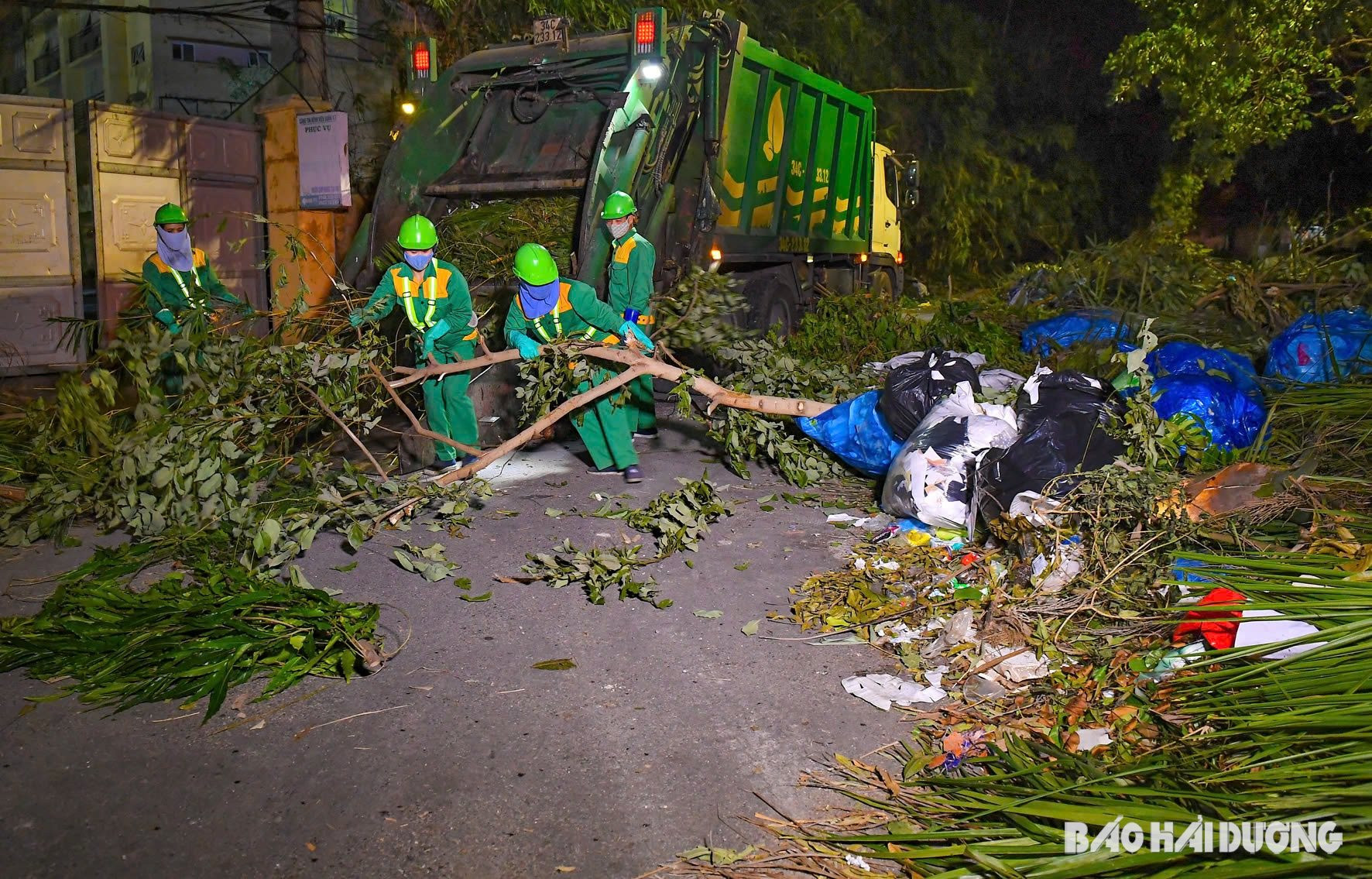
Work 2 or 3 times as much as usual
Early afternoon of September 12, Ms. Pham Thi Thu and Nguyen Thi Thoan - workers of Hai Duong Urban Environment Joint Stock Company were present on Hong Chau street to clean up and collect fallen tree branches after the storm and flood. This street was deeply flooded the previous afternoon, so it was not possible to clean up, so it was not until today that the women were able to collect it. Although the water had not completely receded, the women had to work urgently and quickly to clear the street soon.
Supporting the workers of Hai Duong Urban Environment Joint Stock Company are soldiers from Battalion 4, Engineering Brigade 513, Military Region 3. With the support of soldiers, the working atmosphere is also bustling and less strenuous.
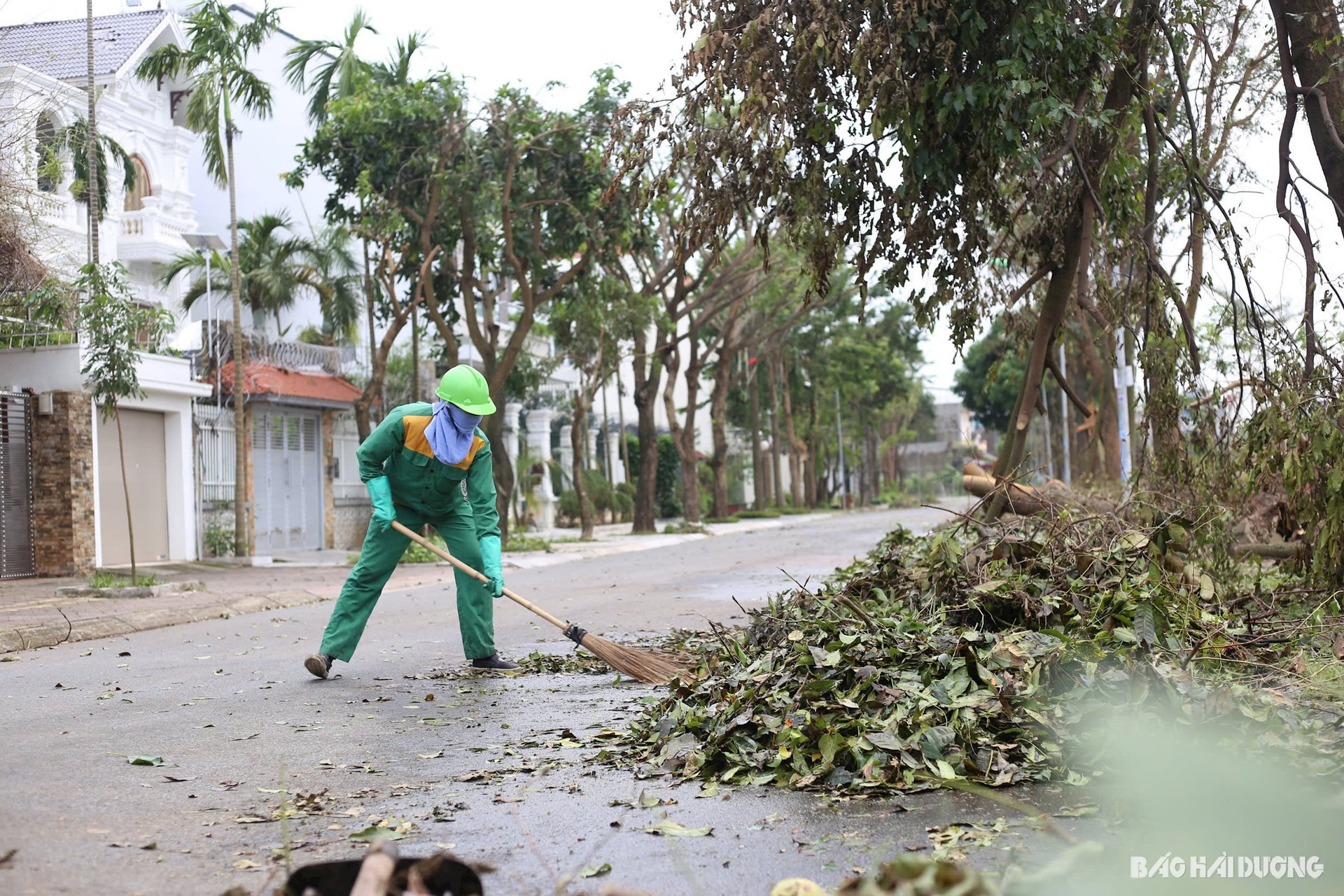
Ms. Thu said that since storm No. 3, they have had to work overtime, day and night. At night, they collect household waste, and during the day, they help clean up fallen tree branches after storms and floods. Although they are carefully equipped with protective gear including masks, boots, and two layers of gloves, they still cannot avoid being stabbed by tree branches. After the storm and flood, water and mud seep into the branches and leaves, making them heavier and more difficult to collect. They have to work harder to sweep up the water-soaked branches and leaves and then put them on the truck for transport and disposal.
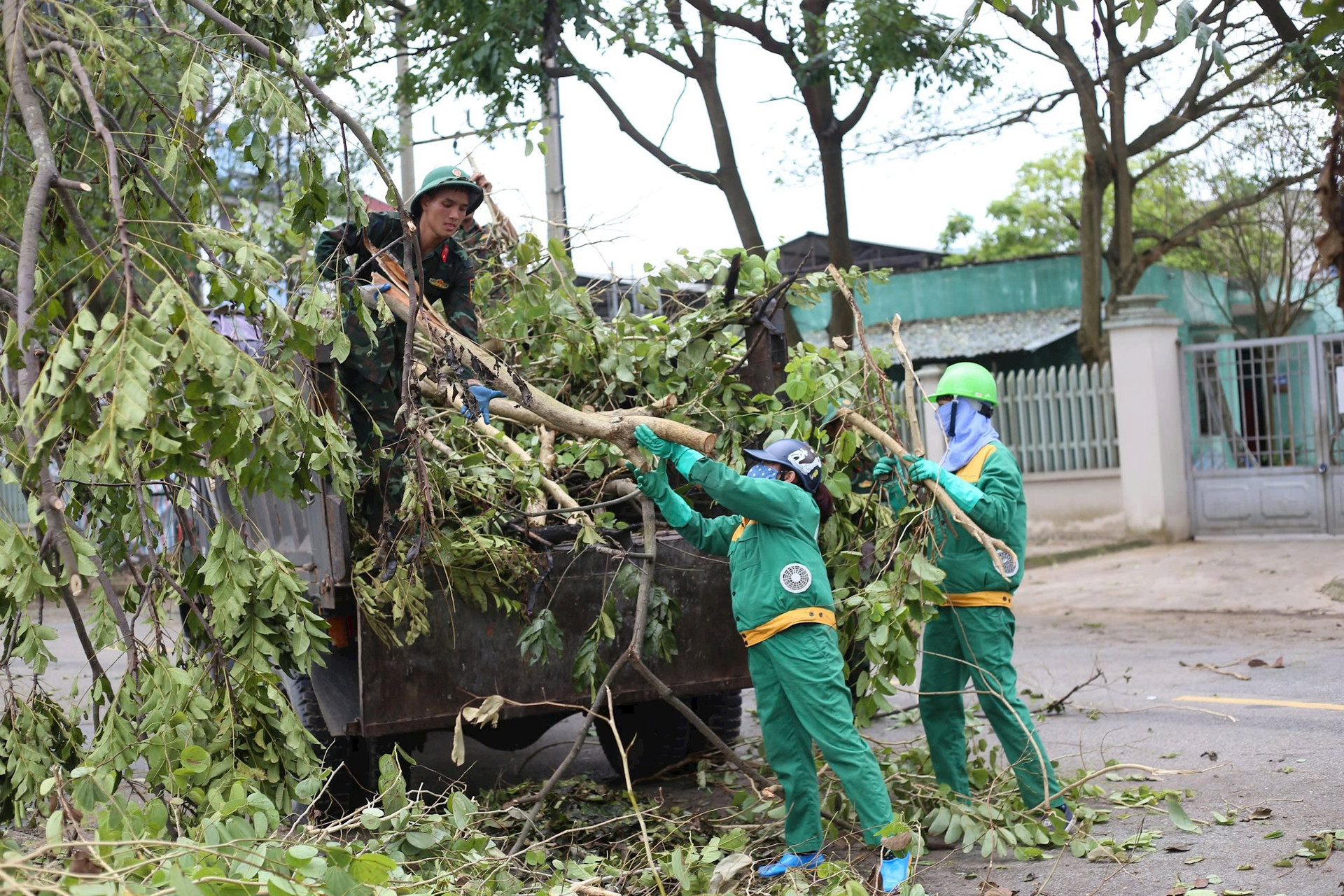
On the afternoon of September 12, the water on Hong Chau Street had receded, but there were still some sections that were flooded, although not too deep. Ms. Thoan pushed her garbage cart through the water to collect the trash. The garbage bags were now soaked with water and too heavy for her to lift onto the cart, so she had to divide them into smaller pieces. While collecting the trash, a resident asked her to help clear the sewers in the flooded area, and she enthusiastically helped.
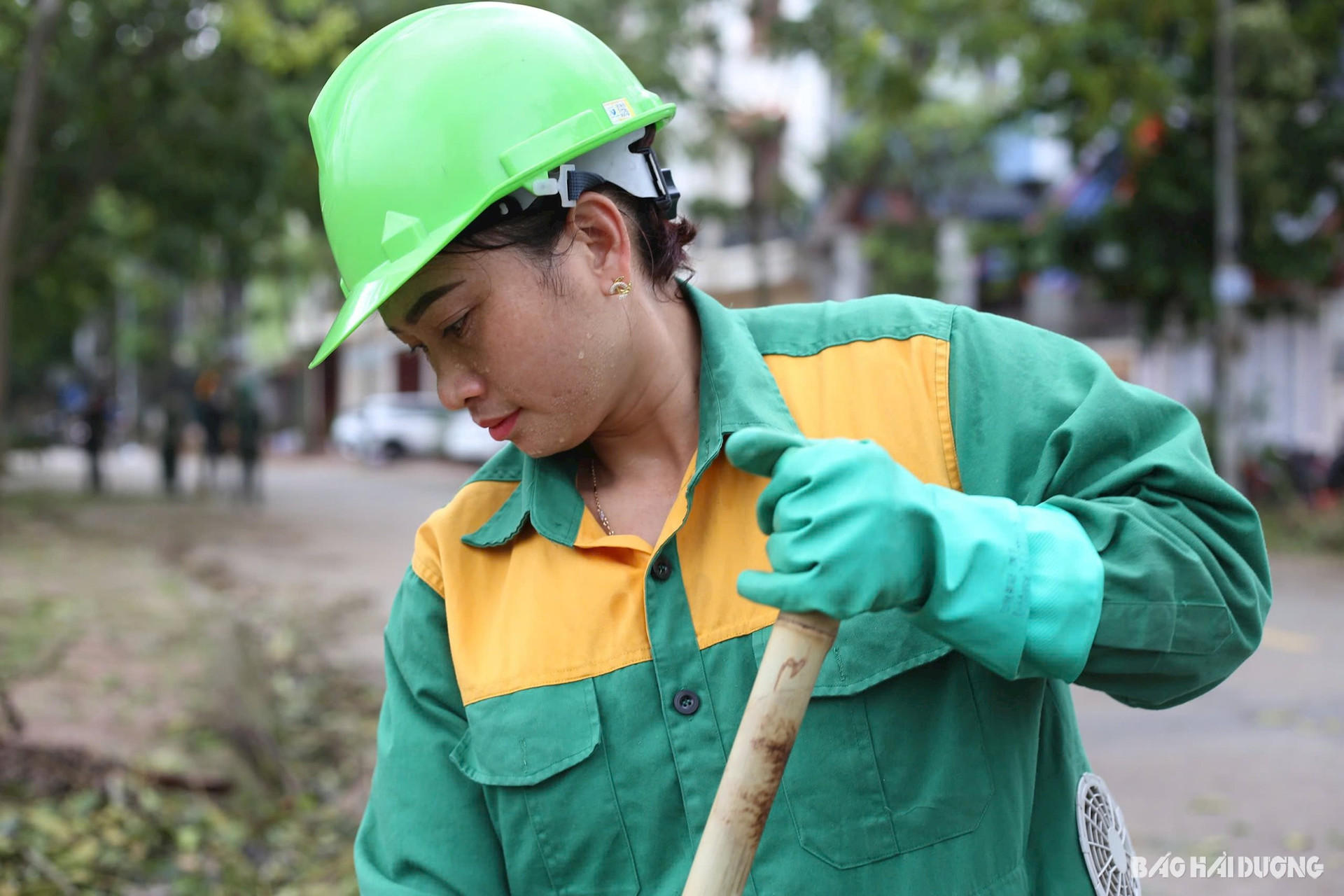
According to Mr. Vu Van Khuong, Deputy Director of the Hai Duong Urban Environment Joint Stock Company's garbage collection enterprise, the time to process all the garbage and tree branches left behind after the storm and flood could last for months, because the workload is huge. In particular, when the river water rises, some roads are deeply flooded, so workers cannot collect garbage and have to postpone their work time to wait for the water to recede.
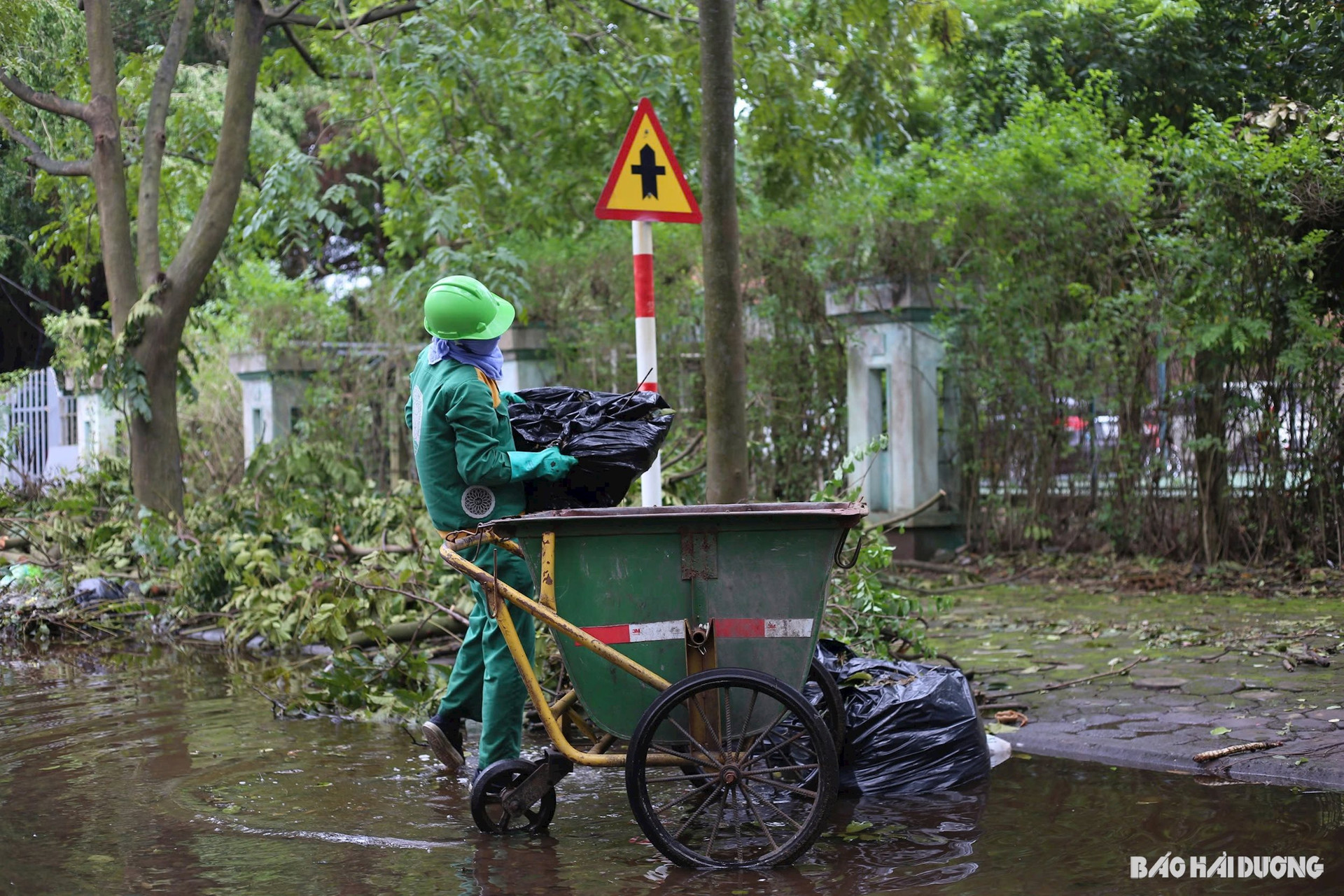
Mr. Nguyen Thanh Do, Director of Hai Duong Urban Environment Joint Stock Company, said that the risk of increased waste is very high if widespread flooding occurs. Because then waste will flow with water from many places into the city. Meanwhile, the amount of waste from households is still generated every day. Therefore, the company's plan is that workers will continue to collect floating waste on moderately flooded streets to minimize the impact on the environment and the risk of disease outbreaks. When the water recedes on a street, workers will focus on cleaning up waste on that street first.
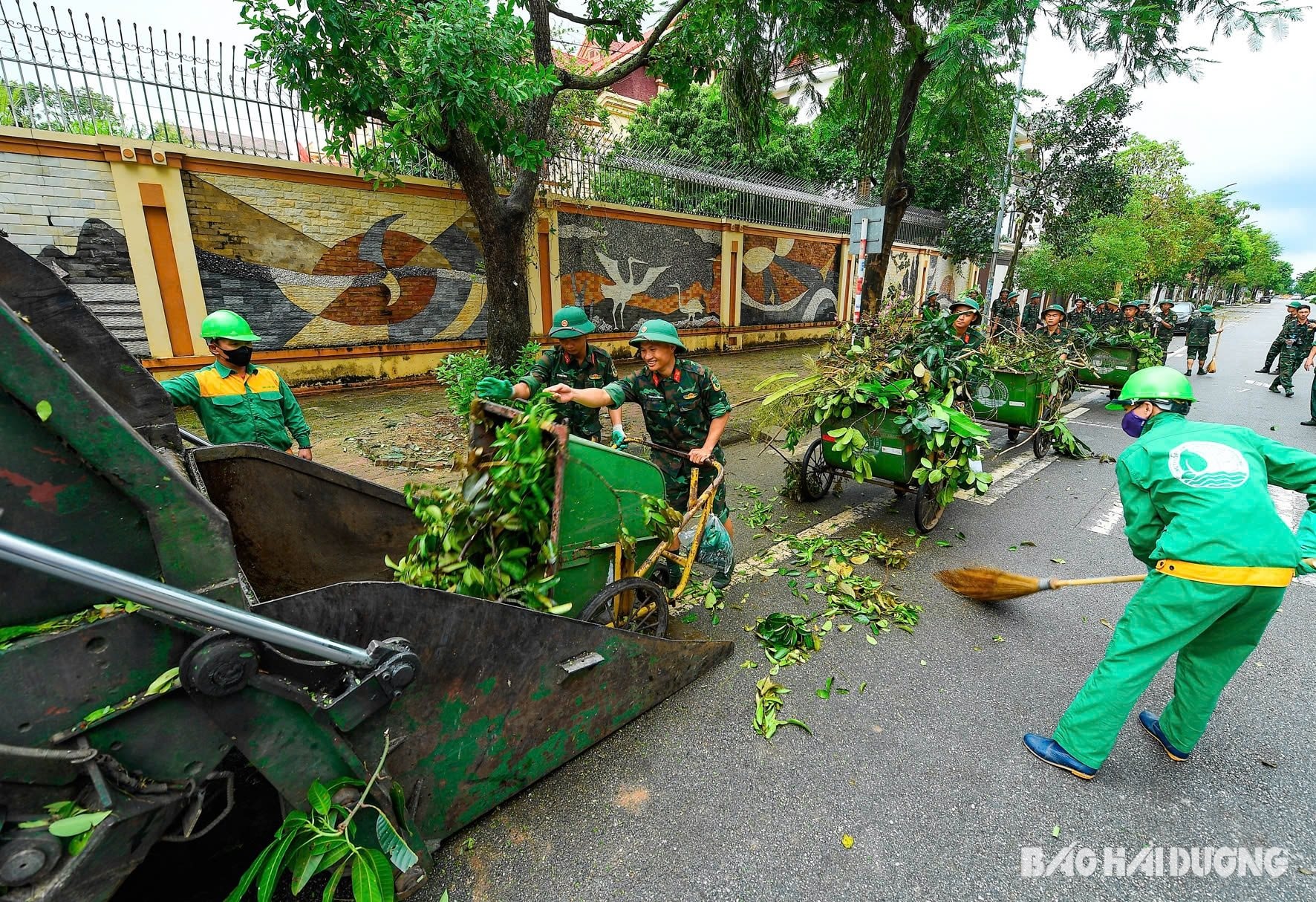
Since the storm, every night, Mr. Do has only been able to catch a few hours of sleep and eat makeshift meals. Every day, from early morning until late at night, he directs and encourages employees throughout the city to urgently clean up the debris caused by the storm and floods. "The workers who work directly have a much harder time. They take turns working day and night, eating and resting irregularly, it's very tiring, but everyone tries their best. Everything is still messy and now many streets are flooded, so the difficulties are compounded," Mr. Do confided.
Before that, all the staff and workers of the above enterprise knew that the storm and flood were complicated, but no one thought that the damage it caused would be so great. In Hai Duong city alone, it is estimated that about 20,000 trees were broken, many streets were blocked, flooded, and the amount of waste was huge. This forced the enterprise to mobilize all 490 staff and workers to clean up the environment instead of taking turns.
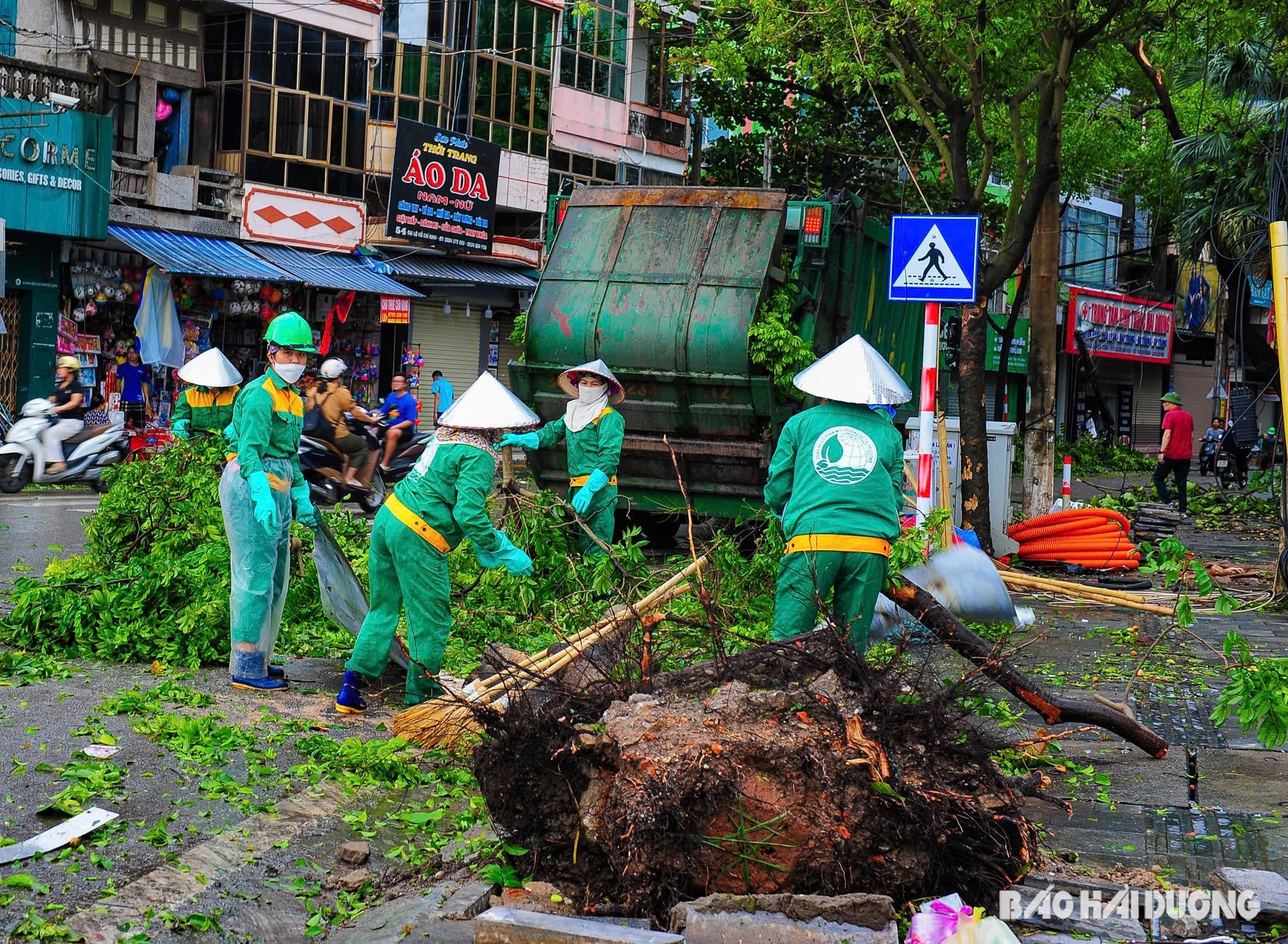
The company's entire means of transport, including 13 garbage compactors, 21 garbage trucks, 2 worker transport vehicles, and 1 material transport truck, were mobilized. The company set out 3 requirements for its workers. One is to ensure absolute safety for people and vehicles while on duty. Two is to try to clear the roads in the shortest time possible. Three is to prioritize the inner city area and main streets to solve the problem of convenient and safe travel for the people.
To fulfill the requirements set by the company, all employees in the company make efforts, try hard, and are highly determined in the spirit of "working 2 or 3 times harder than usual". Teams work day and night, each shift lasts from 12 to 15 hours, or even more. With waste being trees, workers collect and temporarily gather them at 2 locations on Ton Duc Thang and Truong Chinh streets before transferring them to the treatment plant. By doing so, each trip saves 40 minutes of travel time, and the clearance of waste on the streets will be faster.
Can't go home without finishing work
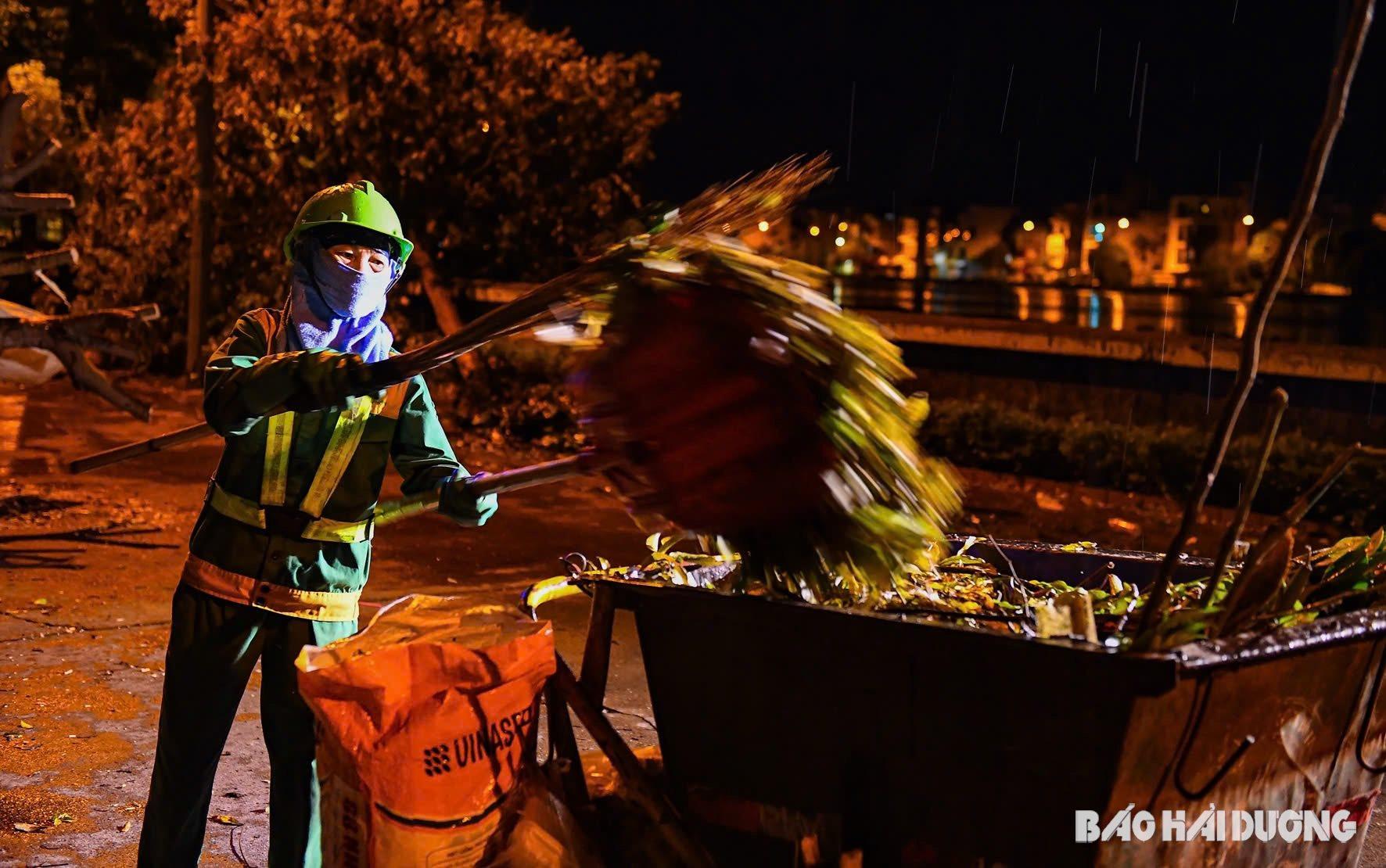
After 10pm, the temporary garbage dump in the area of the Hai Duong City Funeral Home was crowded with garbage trucks. The pile of garbage was dozens of meters high, mostly tree branches broken by the storm and some household waste. Three female workers from the Hai Duong Urban Environment Joint Stock Company struggled to carry the plows of trees onto the garbage truck. Everyone's face was covered in sweat.
Ms. Luong Thi Thu - 1 of 3 workers working here said that she has been working continuously since 3 am. In 20 years of working in this profession, she has never witnessed such a huge amount of garbage. Normally, she only has to work 7-8 hours, but these past few days, the time has been double that.
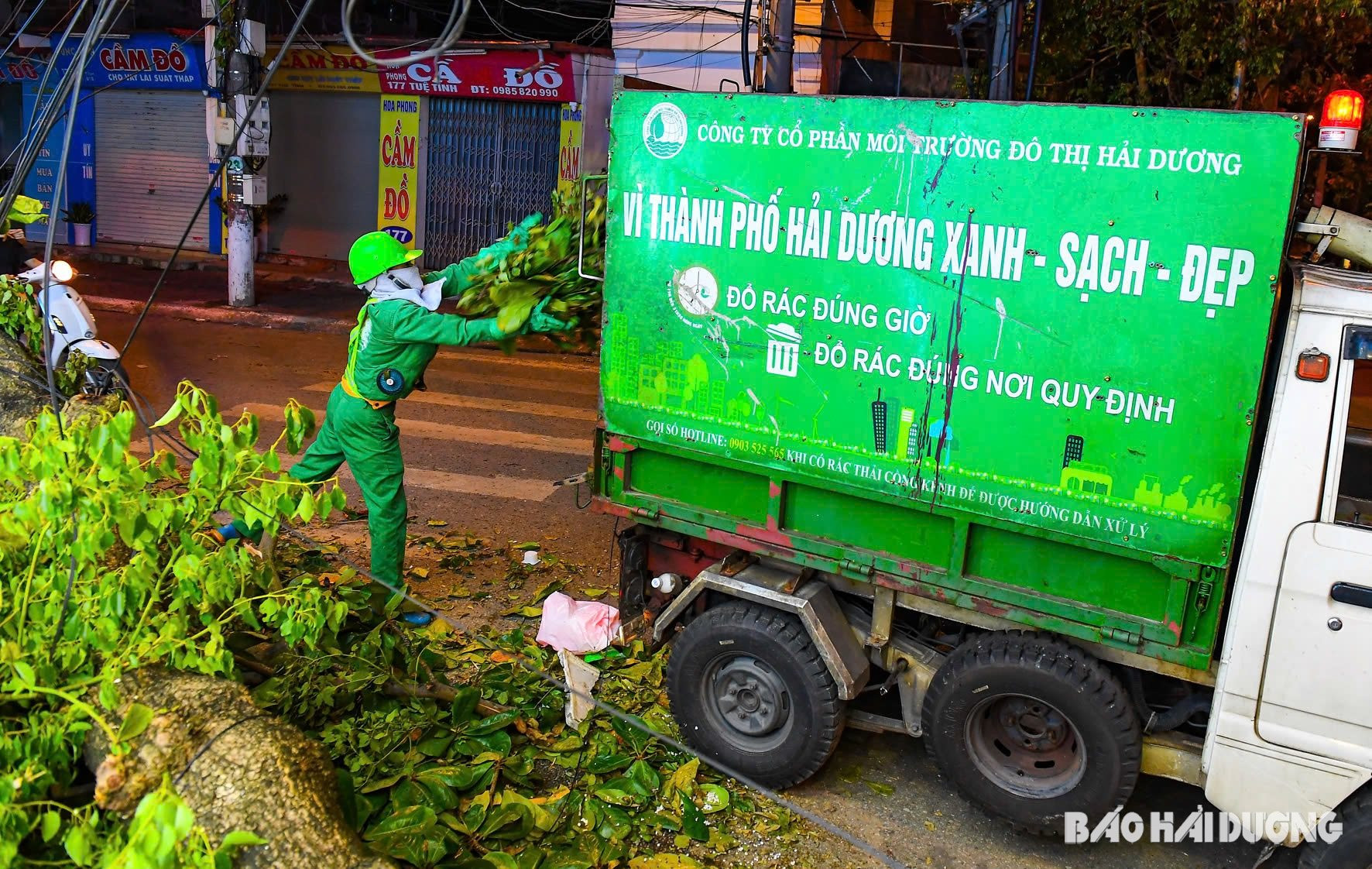
The clock struck nearly midnight, and it started to rain heavily. Most families had fallen asleep. However, Ms. Pham Thi Phien, a garbage collector in Le Thanh Nghi ward, was still working hard in the rain. Although she weighs less than 40 kg and is 1m50 tall, she was agile and nimble in cleaning up the trash. "I'm working quickly to avoid heavy rain causing flooding. From 2pm until now, I haven't eaten anything, only drank water. I should have worked until 11pm, but I kept trying because there was still a lot of work to do. The work wasn't finished yet, so I couldn't go home," Ms. Phien shared.
In her 26 years in the profession, Mrs. Phien has never had to face such a huge workload as this time. She is in charge of 5 streets and 19 alleys. Every day, she and a colleague pick up 6-7 truckloads of fallen tree branches (each truck weighs 1 ton). There are only two of them in the house. Mrs. Phien's husband suffered a stroke, but because of work, she had to let him take care of himself, while she devoted all her time to work. She hopes the river water will recede quickly, the streets will no longer be flooded so that workers can clean up the trash, returning the streets to cleanliness, allowing people to travel conveniently and students to go to school safely.
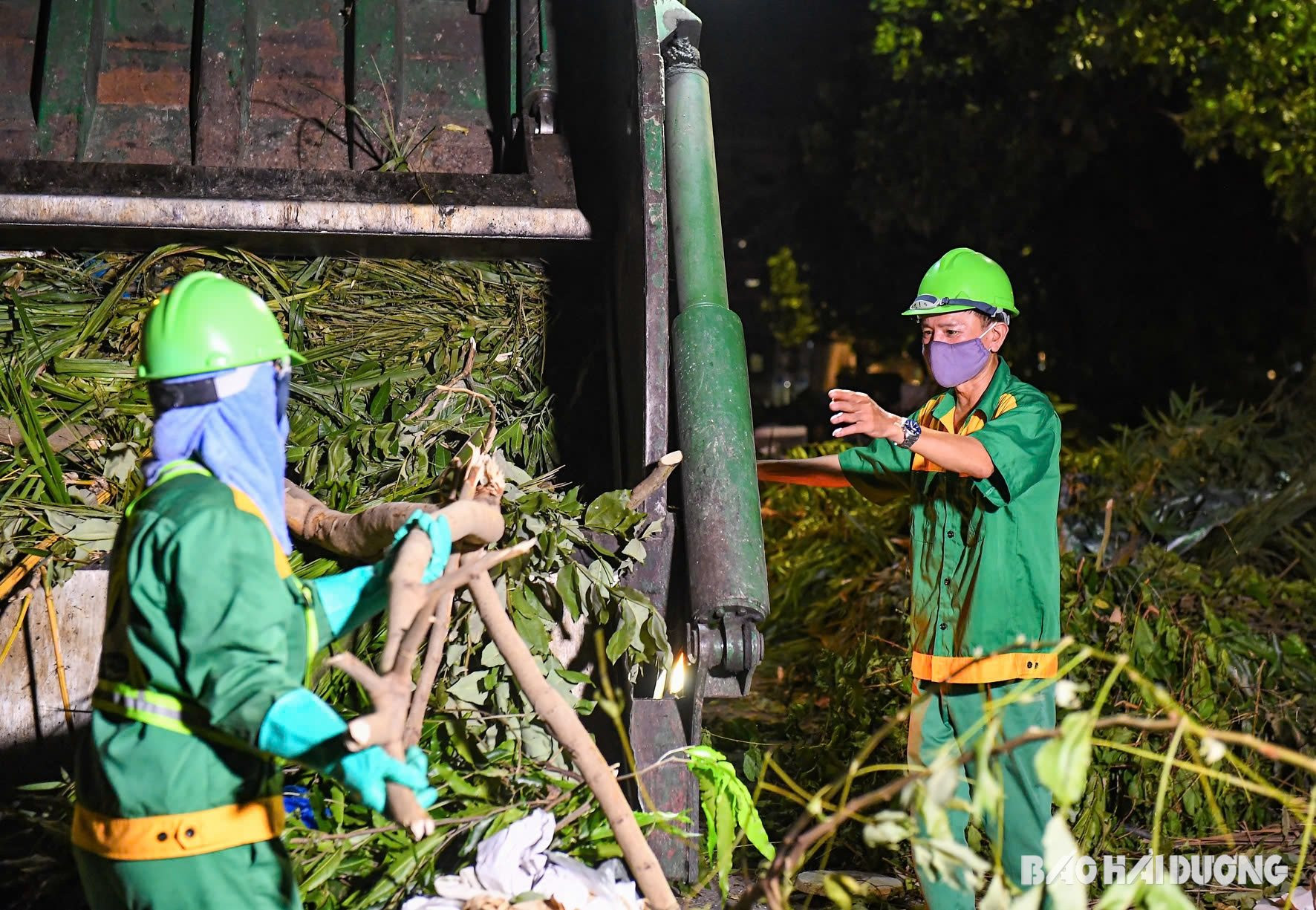
After the storm and flood, the drivers of Hai Duong Urban Environment Joint Stock Company also had the hardest working day ever. On the first day after storm No. 3 passed, Do Duy Phuc drove a garbage compactor from 6am the previous day to 1:35am the next day. He had very little time to eat and rest because the amount of garbage was too large and the company's number of trucks was limited. "I can't count how many trips I made, but I was really tired. However, seeing the city still covered in garbage like this, I told myself to try harder," said Phuc.
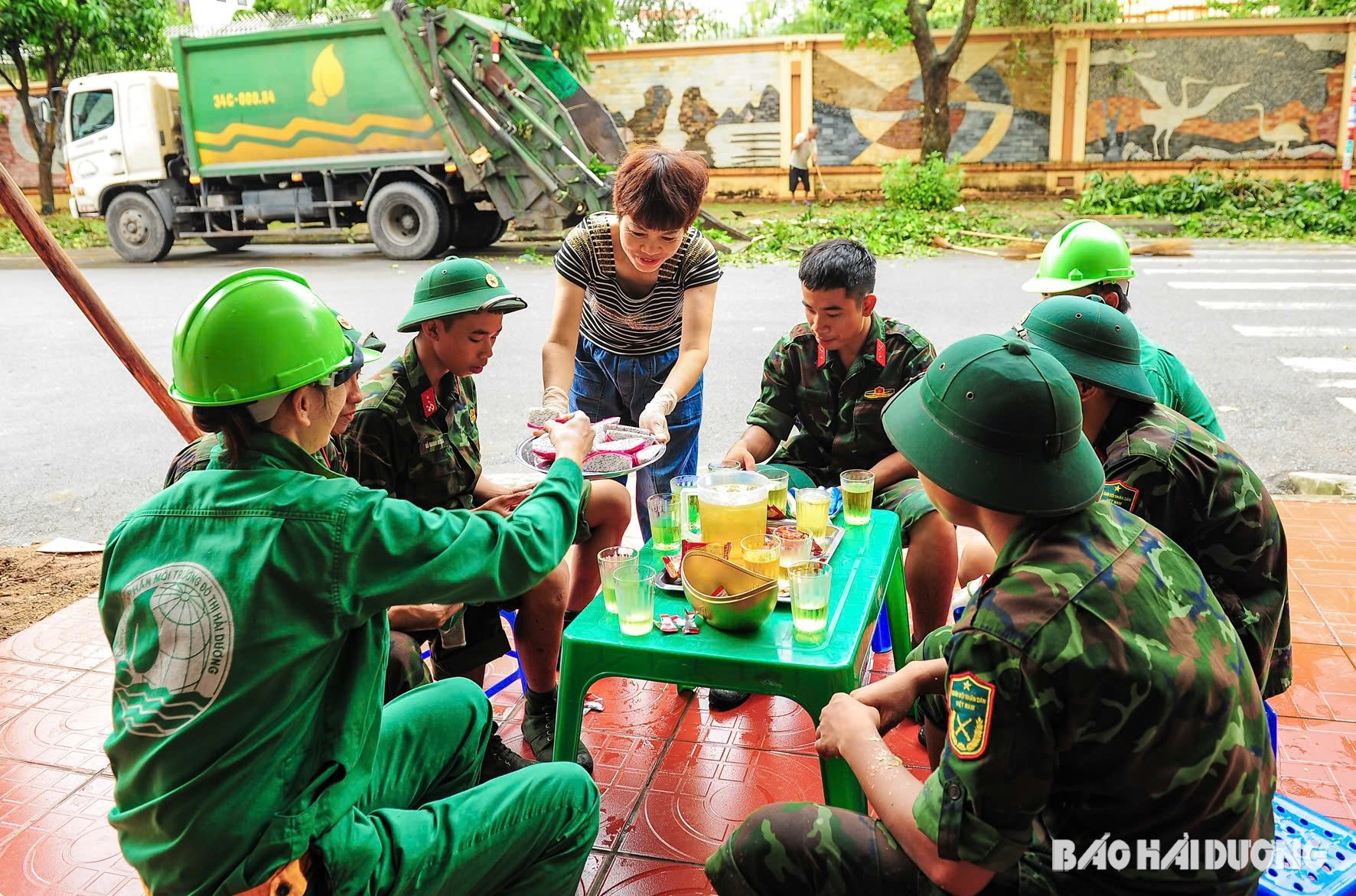
Sharing the hard work of the workers of Hai Duong Urban Environment Joint Stock Company, in recent days, organizations, military units, and residents in residential areas have also participated in supporting the waste cleanup. Many people also bought food and drinks to supply the garbage collectors. The company's leaders also arranged light meals to help workers have more energy to work.
"There was a woman in Binh Han ward who brought us food. She cried and kept shouting at us to keep going, keep going. Her simple, warm affection and care gave us great motivation," said Nguyen Thi Chinh.
TIEN LINH